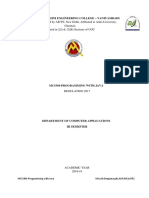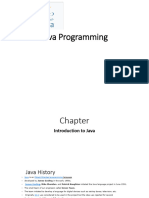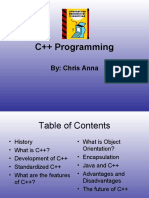0 ratings0% found this document useful (0 votes)
42 viewsJava An Overview For C++ Programmers
The document is an overview of Java presented to C++ programmers. It discusses Java's history and appeal, including its platform independence through bytecode compilation and safety features like automatic memory management. It compares Java and C++, noting Java's lack of pointers but inclusion of interfaces, single inheritance, and virtual functions. The document also covers Java libraries, documentation, and GUI tools. It provides examples and references additional Java resources.
Uploaded by
Waliul BariCopyright
© © All Rights Reserved
Available Formats
Download as PPT, PDF, TXT or read online on Scribd
0 ratings0% found this document useful (0 votes)
42 viewsJava An Overview For C++ Programmers
The document is an overview of Java presented to C++ programmers. It discusses Java's history and appeal, including its platform independence through bytecode compilation and safety features like automatic memory management. It compares Java and C++, noting Java's lack of pointers but inclusion of interfaces, single inheritance, and virtual functions. The document also covers Java libraries, documentation, and GUI tools. It provides examples and references additional Java resources.
Uploaded by
Waliul BariCopyright
© © All Rights Reserved
Available Formats
Download as PPT, PDF, TXT or read online on Scribd
You are on page 1/ 21
JAVA
An overview for C++
programmers
Wagner Truppel
wagner@cs.ucr.edu
March 1st, 2004
The early history
• James Gosling, Sun Microsystems
• Not the usual start for a prog. language
• Consumer electronics, 1991
• Mosaic and the Internet, 1994
• The revolution: applets, 1995
• Since then, many improvements and additions
have been made to the language
• http://java.sun.com/features/1998/05/birthday.html
Mar 1st, 2004 Java for C++ programmers 2
Why is Java so appealing ?
• Platform independent
• Safe
• Easy to learn
• Powerful, well-documented, and easy-to-use libraries
to perform many complicated tasks
• During this presentation, we’ll look into each of these
qualities, and more
• Comparison to C++
• Hands-on activities
Mar 1st, 2004 Java for C++ programmers 3
Platform independence
• Sun’s motto for Java:
write once, run anywhere
• It’s a great idea, but…
• how’s it done ?
• what are the drawbacks ?
Mar 1st, 2004 Java for C++ programmers 4
Platform independence
Mar 1st, 2004 Java for C++ programmers 5
Platform independence
• Wait… so does it mean that Java is an interpreted
language ? Yes, source is compiled into bytecodes.
• Aren’t interpreted languages inherently slower than
compiled ones ? Yes.
• Why you should not care so much, though:
• Java trades speed for
• platform independence
• safety (more on this later)
• Java compilers are pretty darn good anyway
• Still, if you’re really worried about speed, you may
always use the so-called just-in-time (JIT) compilers.
Mar 1st, 2004 Java for C++ programmers 6
Safe and easy to learn
• The first thing to note here is that these are
relative terms
• In this talk, we’ll compare Java and C++
• The general consensus is that Java is easier to
learn and use than C++, but I’ll let you be the
judge of that.
• Is Java safer than C++ ?
Mar 1st, 2004 Java for C++ programmers 7
Safer than C++ ?
• What do we mean by “safe” anyway ?
Less prone to programmer mistakes
• Java achieves better safety than C++ by
• providing sandboxes (won’t talk much about them here)
• checking every array access for out-of-bounds errors
• eliminating direct access to pointer operations
• automatically reclaiming any (heap) memory space not in
use (automatic garbage collection)
• having a less fragile approach to multiple inheritance
• making every function virtual
• providing, generally speaking, a simpler syntax than C++
Mar 1st, 2004 Java for C++ programmers 8
No pointers ?
• Some people claim that Java has no
pointers… Not true!
• All objects are accessed through references,
which are automatically de-referenced
pointers
• However, the pointer nature of these
references is hidden from the programmer.
Why ?
• Reduced number of pointer-related errors
Mar 1st, 2004 Java for C++ programmers 9
Automatic garbage collection
• Objects are always allocated in the heap, using new, as in
Foo f = new Foo();
• itself is always allocated in the stack
f
• the object referenced by f is allocated in the heap
• recall that memory allocation in C++ is not so simple
• Java keeps track of how many valid references exist for each
object – when an object has no more references to it, the
memory space it occupies in the heap gets reclaimed
• No, it doesn’t mean that you may be sloppy
• Automatic garbage collection has pros and cons
• Pro: prevents many common memory allocation bugs
• Con: has a negative impact on your program’s efficiency
Mar 1st, 2004 Java for C++ programmers 10
No multiple inheritance ?
• C++ inheritance forces the inheritance of both data and
behavior (code)
• That’s a very fragile approach – in order to inherit some behavior your
class may have to gain some data as well, even if it’s not really needed
• Java solves that problem and at the same time eliminates the
need for multiple inheritance by defining something called an
interface
• Interfaces only define the expected behavior of a set of functions, like a
contract – no data and no implementation
• A class may implement as many interfaces as needed
• Of course, regular inheritance between classes is still allowed,
but a class may inherit from only one other class - no multiple
class inheritance in Java
Mar 1st, 2004 Java for C++ programmers 11
Functions are always virtual
• All (non-static) functions in Java follow a late-
binding process
• Which function code is actually executed depends on the
actual run-time type of the object on which the function is
being called, not on the object’s declared type at compile
time
• In C++, unless one declares a function to be virtual,
the code to be executed is decided at compile time
• Thus, in Java, all (non-static) functions are virtual
• Late-binding is a little slower but prevents common
hard-to-find bugs
Mar 1st, 2004 Java for C++ programmers 12
Other differences between Java & C++
• (Almost) everything is an object
• Only primitive types (boolean, char, int, long, float, double)
are not objects
• Function arguments are always passed by value
• Objects are not copied – only their references are
• Neat solution to name collisions (packages)
• No separation between header and implementation
• No operator overloading
• No structs
• No generics (templates) and no enums (constant
enumerations) until Java 2, 1.5
Mar 1st, 2004 Java for C++ programmers 13
A few other nice things about Java
• Inherently multi-threaded
• Threads are supported at the language level and are
also objects
• Much nicer compiler and run-time error messages
than C++
• Exception handling is idiomatic – every Sun-
written library uses it and does so consistently
• Powerful and easy-to-use libraries for data
structures, multi-threading, networking, I/O,
graphics, GUI
Mar 1st, 2004 Java for C++ programmers 14
Other cool stuff
• Javadoc
• Auto-documenting your code
• Your comments are nicely formatted into a set of
HTML pages
• C++ has something similar: Doxygen
• Swing
• Dynamically pluggable look-and-feel (plaf)
• Powerful, easy-to-use GUI toolkit
Mar 1st, 2004 Java for C++ programmers 15
Examples, please !
Mar 1st, 2004 Java for C++ programmers 16
Hot from the Sun…
• Current release version: Java 2, 1.4.2
• Java 2, version 1.5 beta is out
• Support for generics (templates)
• Autoboxing
• Enhanced for loop
• Enumerated types
• Static import
• C-style formatted input/output
• Variable arguments
• and more…
• http://java.sun.com/developer/technicalArticles/releases/j2se15/
Mar 1st, 2004 Java for C++ programmers 17
References – online
• The creators of Java
• http://www.java.sun.com/
• The Java Developer Connection is a must. In particul
ar, their Tech Tips free mailing list is awesome
• http://developer.java.sun.com/
• A cool site to keep in touch with Java news
• http://www.ibiblio.org/javafaq/index.shtml
• This site's free subscription mailing lists are excellent
• http://www.javaworld.com/
Mar 1st, 2004 Java for C++ programmers 18
References – books I (basics)
• The Java Tutorial: A Short Course on the Basics
• Thinking in Java (http://www.mindview.net/Books/TIJ/)
• The JFC Swing Tutorial
• Java in a Nutshell
• Java Cookbook
• The Elements of Java Style
Mar 1st, 2004 Java for C++ programmers 19
References – books II (intermediate)
• Practical Java Programming Language Guide
• Effective Java Programming Language Guide
• Java Pitfalls: Time-Saving Solutions and Workarounds to
Improve Programs
• Design Patterns Java Workbook
• GoF’s Design Patterns (C++)
Mar 1st, 2004 Java for C++ programmers 20
Questions ?
I’d like to thank
• all of you for coming
(and staying !)
• Titus Winters and Dan
Berger, for organizing these
talks and for inviting me to
give this one
Mar 1st, 2004 Java for C++ programmers 21
You might also like
- Object Oriented Programming in C 4th Edition Solution ManualNo ratings yetObject Oriented Programming in C 4th Edition Solution Manual3 pages
- 1) Explain Object Oriented Programming Concept ObjectsNo ratings yet1) Explain Object Oriented Programming Concept Objects10 pages
- Object Oriented Programming and C++: C++ Compared To JavaNo ratings yetObject Oriented Programming and C++: C++ Compared To Java28 pages
- Que. Difference Between C++ and Java. AnsNo ratings yetQue. Difference Between C++ and Java. Ans19 pages
- WINSEM2024-25_BCSE103E_ELA_VL2024250505244_2024-12-14_Reference-Material-I (1)No ratings yetWINSEM2024-25_BCSE103E_ELA_VL2024250505244_2024-12-14_Reference-Material-I (1)83 pages
- JAVA V.S. C++: Programming Language ComparisonNo ratings yetJAVA V.S. C++: Programming Language Comparison15 pages
- Differences Between Java and C/C++: The PreprocessorNo ratings yetDifferences Between Java and C/C++: The Preprocessor4 pages
- Subject Code: 4639302 Subject Name: Programming in Java Unit 1 - IntroductionNo ratings yetSubject Code: 4639302 Subject Name: Programming in Java Unit 1 - Introduction17 pages
- Introductiontojava 110915052711 Phpapp01No ratings yetIntroductiontojava 110915052711 Phpapp0122 pages
- Core Java - Basics of Java Interview QuestionsNo ratings yetCore Java - Basics of Java Interview Questions51 pages
- 3.characteristics of Java: White Paper Where The Java™ DevelopersNo ratings yet3.characteristics of Java: White Paper Where The Java™ Developers6 pages
- Core Java - Basics of Java Interview QuestionsNo ratings yetCore Java - Basics of Java Interview Questions50 pages
- 1.300 Core Java Interview Questions (Basic - X1time)No ratings yet1.300 Core Java Interview Questions (Basic - X1time)181 pages
- Primitive Types: Boolean Char Byte Short Int Long Float DoubleNo ratings yetPrimitive Types: Boolean Char Byte Short Int Long Float Double6 pages
- Object-Oriented Programming Languages: Java vs. C++ Programming Language ComparisonNo ratings yetObject-Oriented Programming Languages: Java vs. C++ Programming Language Comparison8 pages
- C++ vs. Java: Similiarities & Differences: Dr. Jeyakesavan VeerasamyNo ratings yetC++ vs. Java: Similiarities & Differences: Dr. Jeyakesavan Veerasamy15 pages
- 300 Core Java Interview Questions (2023) - JavatpointNo ratings yet300 Core Java Interview Questions (2023) - Javatpoint52 pages
- Quotation: North West Power Generation Company LimitedNo ratings yetQuotation: North West Power Generation Company Limited1 page
- Department of Ece, Adhiparasakthi College of Engineering, KalavaiNo ratings yetDepartment of Ece, Adhiparasakthi College of Engineering, Kalavai27 pages
- C++ in Huge AAA Games - Nicolas Fleury - CppCon 2014No ratings yetC++ in Huge AAA Games - Nicolas Fleury - CppCon 201451 pages
- Assignment: Inheritance Class: Xii, C++ (Computer Science)No ratings yetAssignment: Inheritance Class: Xii, C++ (Computer Science)6 pages
- Bca New Syllabus - Tiruvalluvar University100% (2)Bca New Syllabus - Tiruvalluvar University52 pages
- C++ - Module 02: Ad-Hoc Polymorphism, Operators Overload and Orthodox Canonical ClassesNo ratings yetC++ - Module 02: Ad-Hoc Polymorphism, Operators Overload and Orthodox Canonical Classes13 pages
- Abdul Karim Shahid (Akarim@cuilahore - Edu.pk)No ratings yetAbdul Karim Shahid (Akarim@cuilahore - Edu.pk)53 pages
- 313304-Object Oriented Programming Using C++No ratings yet313304-Object Oriented Programming Using C++7 pages
- B.sc-computer-Science 2017 2018 SyllabusNo ratings yetB.sc-computer-Science 2017 2018 Syllabus70 pages































































































